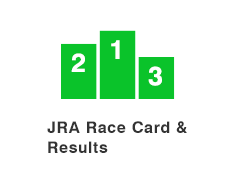2015 February Stakes (G1) - Preview
This Sunday, Tokyo Racecourse hosts the February Stakes, the first top-level race of the year and only one of two JRA G1 races run over dirt – the February Stakes and the Champions Cup.
The two dirt G1s determine the JRA top dirt horse of the year and the February Stakes naturally draws most of the best runners over dirt, including some from the NAR circuit. This year sees one of the strongest fields in years. Eight top class races winners have been registered for the race, the biggest number in 12 years and the second biggest in the race's history after 2002 saw the field studded with 10 top class race victors. Even despite the absence of reigning dirt horse of the year, the Dubai-bound Hokko Tarumae, runnerup in last year's February Stakes, the competition will be tough to topple.
Favorite come Sunday is most likely to be Copano Rickey, last year's winner. Ironically, Copano Rickey went to the gate the least favorite of the field after losing the fans' support due to his previous two runs. But, he still managed to nab the first-place prize of 94 million yen, along with his first G1. More importantly, Copano Rickey went on to prove that he could keep up the good work. This year, he's back and looking to become the first horse to win successive February Stakes.
This year's February Stakes is also exciting for its wide range in age. Four-year-olds vie alongside horses double their age. And, horses yet to capture a big race challenge champions, some who have recently won, others whose last big win may be two, even three years ago.
Though the February Stakes has only been in its present format since 1997, the race dates back over three decades. The oldest of the JRA's graded dirt races, the inaugural February Stakes was held in 1984 as the G3 February Handicap. The race was promoted to Grade 2 in 1994, when it was also renamed the February Stakes.
In 1997, the February Stakes became the first Japanese Grade 1 race held on dirt and was internationalized in 2007. It was the spring counterpart to the Japan Cup Dirt, now run at Chukyo Racecourse in Nagoya and rechristened the Champions Cup.
The February Stakes has been held at Tokyo over the distance of a mile except once, in 2003, when the Fuchu track was undergoing renovation and the race was run at Nakayama over 1,800 meters.
The left-handed course starts in a pocket off the backstretch and the initial 150 meters are run over turf. The track slopes gently downward from the start for 400 meters before rising slightly then dipping again until it flattens shortly before the 800 meter mark. The run to the first turn exceeds 600 meters before the course travels around the bend for 450 meters and leads into the final straight of 501 meters. Immediately into the stretch, the track begins a climb of some 3 meters until just before the 200 meter mark and is then flat until the finish line.
This year marks the 32nd running of the February Stakes.
In 2009, Success Brocken set the race record of 1 minute, 34.6 seconds.
Sixteen of the 21 horses registered will make up the field. All but two from the NAR circuit are from the Ritto Training Center in western Japan.
Post time on Sunday, Feb. 22, is 3:40 p.m. The February Stakes is the 11th race on the Sunday card of 12 at Tokyo. The following are the expected popular choices.
|
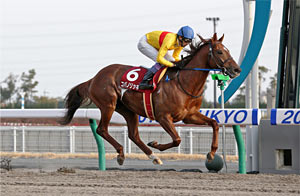
Copano Rickey
Copano Rickey – The 5-year-old Gold Allure-sired Copano Rickey has proven a consistent runner, with 11 of his 15 runs ending in the money, eight of them in the winner's circle. His win of the February Stakes last year as the least popular pick of the race was far from surprising considering his overall performances before that. More surprising was the fact that he had fallen so quickly from grace at the betting windows after returning from a layoff to run 10th and ninth. The third time was the charm, however, and Copano Rickey went on to score two more firsts and a second at NAR tracks before taking on the G1 Champions Cup in December. The race favorite in the reincarnation of the Japan Cup Dirt, he missed the break and disappointed with a 12th-place finish, but ran a solid second to Hokko Tarumae next time out in the 2,000-meter Tokyo Daishoten on Dec. 29. On Jan. 25, Yutaka Take took the reins for the first time and brought him home in first, winning by 4 lengths in the G2 Tokai TV Hai Tokai Stakes at Chukyo over 1,800 meters. Though this will be his first time over a mile in six races, Copano Rickey obviously finds the distance at Tokyo to his liking. He is said to be looking good and chances of back-to-back wins, the first of the February Stakes, are considered high. |
|

Wide Bach
|
|
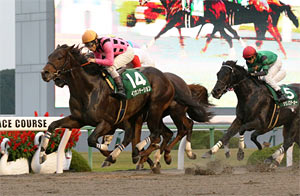
Incantation
Incantation –The 5-year-old Sinister Minister-sired Incantation took on the Champions Cup last year after scoring three wins straight – first in two open-class races and then in the G3 Miyako Stakes. The conditions were against him on the big stage, however, and a wide draw and inability to get a clear run proved factors in his 10th-place finish. This year he came back for the G2 Tokai Stakes and ran third just a nose off runnerup Grand City. Apart from two wins in G3 events, it was likely his best performance yet, one that saw him running from the far back after he stumbled just out of the gate. Into the stretch, however, he turned in a blistering drive that won him marks far higher than his third-place finish. Though it was a solid loss to Copano Rickey, the run will surely have done much to sharpen him from the 10-kg gain posted for that race and put him in a better place this time out. Incantation has only had one race over dirt at Tokyo, a fourth place. But three wins at Niigata over dirt and two at Chukyo over the same, indicate counterclockwise tracks are to his liking. His ability to perform well from any position is a plus. |
|

Best Warrior
Best Warrior – A 5-year-old from the stable of Sei Ishizaka, Best Warrior has posted 1–5–11 from his last three outings, all in top class races. His win came at Morioka in the Mile Championship Nambu Hai on Oct. 13, followed by a fifth-place run at the same venue in the JBC Classic on Nov. 3. His last race was the Dec. 7 Champions Cup. From his last two races, Best Warrior would have seemed to have grown dull, but he is a horse that wants a mile, nothing more, maybe less. He has scored four wins, one second and a third from his seven runs over the mile, but has failed to win anything longer, though he did come close, with a second in a 1,870-meter race at Sonoda. Though this will be his first race since early December, Best Warrior has been trained up the hill course at Ritto from the end of January and has performed well. His ability to run his own race is a plus. |
|
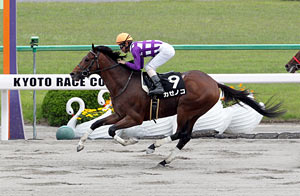
Kazenoko
Kazenoko – The 4-year-old Kazenoko, a son of Agnes Digital broke his maiden on his eighth try, in what was his third run on dirt since switching from turf, He has gone on to post three wins in his seven races since. After three wins culminating in his first big race win, the Japan Dirt Derby at Ohi, he ran seventh in the JBC Classic at Morioka, then seventh again in the Champions Cup at Chukyo. In late January, however, he ran second at Kawasaki in the Kawasaki Kinen over 2,100 meters, finishing just ¾ length behind Hokko Tarumae. Kazenoko prefers to run from the rear and if the pace is high on Sunday, he may be able, with a bit of luck and his powerful late drive, to match his sire's win of the February Stakes in 2002. |
|

Roman Legend
Roman Legend – Roman Legend is a 7-year-old son of Special Week. Debuting at 3, this colt was near legendary, as he scored nine wins from 13 starts and, at one time, marked a six-win streak. Since 2013, however, his race results have been peppered with finishes out of the money and he currently has 10 wins from 21 starts. Still, his third in the Champions Cup following a win of the G3 Elm Stakes at Sapporo would indicate he is not yet resting solely on his laurels. His last start was the Dec. 29 Tokyo Daishoten at Ohi in which he ran fifth. Raced predominately over 1,800-2,000 meters, this will be only his second time at the mile and first time since May 2013, when he ran third in the Kashiwa Kinen at Funabashi. Roman Legend has yet to win a JRA big race, but his third in the Champions Cup saw him but 0.2 seconds off winner Hokko Tarumae. Despite the time between races, Roman Legend has shown he does better with a bit of time between runs. He is one to keep an eye on this Sunday. |
|
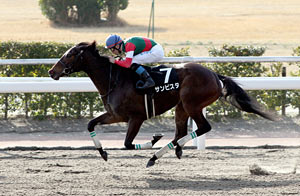
Sambista
Sambista – A 6-year-old mare trained by Katsuhiko Sumii, Sambista, by Suzuka Mambo, has run 15 of her 20 races in the money. She has won eight, including three last year and her last outing, an all-female TCK Jo-O Hai at Ohi on Jan. 21. Sambista ran fourth, just 0.4 seconds off the winner in the Champions Cup last year. She will, however, be taking on her first mile and running at Tokyo for the first time, only her second time to the left. Still, Sambista is one to give the boys a run for the money. If she should win, she would be the first female to win since Hokuto Vega in 1996, when the race was still a G2. The best result since the race was made a G1 in 1997 was a second-place finish by Gold Tiara in 2000. |
|

Wonder Acute
Wonder Acute – Not to be overlooked is another oldtimer, the 9-year-old Wonder Acute, by Charismatic. 2014 saw Wonder Acute score one first and two thirds from six starts, not lame considering they were all top class races, two of them JRA events – the February Stakes (sixth place) and the Champions Cup (fifth place). After the Champions Cup, Wonder Acute ran seventh in the Tokyo Daishoten at Ohi and has not been raced yet this year. Wonder Acute has experience over the Tokyo mile. He won the Musashino Stakes in 2009 and though it's been a while, he is physically not showing age. He ran third in both the 2012 and 2013 February Stakes and may once again be able to make the top spots. If he would win, he would be the first 9-year-old to win a JRA G1 ever. Francis Berry is slated to ride. |
|

- Preview
- Barrier draw
- Past performances of runners

- News
- Race result
- Video
(English racecall for races after 2006)
- 2026

- 2025

- 2024

- 2023

- 2022

- 2021

- 2020

- 2019

- 2018

- 2017

- 2016

- 2015

- 2014

- 2013

- Photo Gallery
2026 Winner: Costa Nova
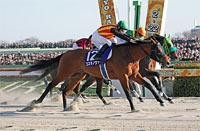
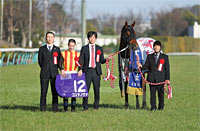
2025 Winner: Costa Nova
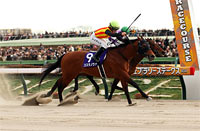
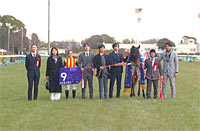
|






